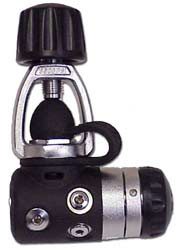Regulators - First Stages

First stages come in several forms. Your main options are generally:
- balanced or unbalanced
- piston or diaphragm
- sealed or unsealed
Manufacturers will try to make a big deal out of these and various other features. Here's what I think:
- balanced or unbalanced - Today only the very cheapest regs are unbalanced designs. Breathing performance will suffer, and any reg that cheap will likely be deficient in other areas. There is no reason to buy an unbalanced first stage.
- piston or diaphragm - This doesn't much matter, there are good designs that use both systems - worry about other things.
- sealed or unsealed - This refers to whether or not water can enter the first stage. If water can enter, then so can sand and grit, which will inevitably cause a malfunction, probably while you are in the water. Also, for cold-water diving ( not ice diving, just cold water, say 45°F ), the water inside the first stage could actually freeze, with the same result. Do not buy an unsealed regulator for use around here. In fact, don't buy one, period. Sealed designs are generally more expensive to buy and maintain, but it is worth the extra cost. Some regulators ( Genesis, Sherwood ) accomplish the same effect without technically being sealed. This is just as good, maybe better, because the design is simpler.
Another thing to look for in a first stage is ports - size, number, and placement. Many regulators have one LP port specially for your main second stage, which supposedly flows more. Sometimes it is even a different size than the others. I don't really care for this idea. Look for as many LP ports as you can get, at least four, for hooking up all the extra coldwater gear that is used in the North Atlantic. Another nice feature is multiple HP ports, which allows some selection in the placement of your gauges. Some regs have swiveling ports and other do-dads. Maybe convenient, but also adds extra o-rings, complexity, cost, and failure points.
Finally, there is the question of DIN or yoke fitting. The regs you learned on were almost certainly yoke-type, with a horseshoe-shaped bracket with a knob at the back to attach to the tank. This is the commonest type in the U.S. and neighboring areas, both for purchase and rental. However, if you think you might ever have pretensions of becoming a technical diver, you may want to invest in DIN-type fittings, which screw directly into the tank valve. Deciding up front can save the expense of converting over later ( both tank valves and regs. )
DIN hardware is more expensive than yoke. It is also more troublesome to setup and break down, and, in truth, is little more reliable than yoke hardware. The DIN O-ring is rated for higher pressure than a yoke O-ring ( mainly by virtue of simply being bigger. ) However, on every regulator I have seen, the DIN conversion kit is clearly a grafted-on afterthought, containing many more hidden internal O-rings than the equivalent yoke kit, mostly of the small fragile variety. This pretty much negates the advantage of the one O-ring you can see. Modern yokes have robust and beefy construction, unlike old ones, and are capable of handling the same pressures as DIN fittings, although they are not officially rated for it. Yoke O-rings will wear out prematurely under excessive pressures, but so what ...

Non-O2-rated O-rings are available at Home Depot for pennies each. There's nothing magical about scuba O-rings; just take one down to the hardware store, match up the size, and stock up. These may not be quite the same specifications as the ones you pay a dollar each for at the dive shop, and may not last quite as long, but for the price, they don't have to. It might sound a little dangerous to knowingly substitute a lower quality part, but in this case, it's really not. 99% of O-ring failures occur when you first turn on the tank valve and thus will occur in the boat or on the beach, not in the water. This is a minor inconvenience, nothing more. Oxygen-compatible O-rings are harder to find, although some specialized industrial supply houses carry them.

